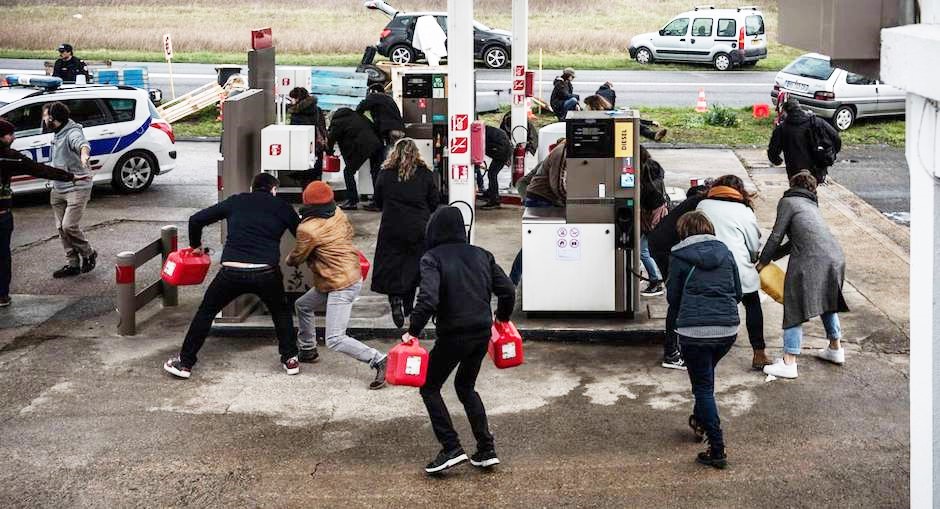The French series L'Effrondrement has an impact on the viewer because it dramatises some narratives that we have already begun to generate during the last crises.
 A scene of an episode of the French series L'Effrondrement.
A scene of an episode of the French series L'Effrondrement.
The apperance of series that seek to create some kind of concrete imaginary about a future between the probability and the dystopia is no longer an anecdote.
What at the time was an irreverent novelty compared to the conventional offer on television, has become a constant that has found a market. Among all the different contents available (not all of the same quality), one of the most original creations L'Effrondrement (The Collapse).
Perhaps the greatness of this eight-episodes French mini-series lies in the fact that, precisely, it does not try to recreate a long-term future in which technology has completely disfigured the appearance of humanity, or to mix different layers of classic narrative fiction. Far from that. It does not seek to create hypotheses, but rather to expand the magnitude of the present crises that we are already suffering as societies.
The different stories, connected to each other by the characters and the decisions they make, seem close to us. The series gets rid of all political correctness (which probably is the mistake of other series, such as Years and Years) and appeals first to the individual, to the personal condition, and then to the configuration of the collective.
It does so from the perspective of a real problem. What would happen if the system collapsed, if there where no basic supplies available, if everything was paralysed and life was reduced to a survival mode. What would happen if we all would need to find food and a place where there was still energy available?
The story of L'Effrondrement is by no means distant. Elderly people dying alone in nursing homes; rich hiring millionaire life insurances which give them access to a bunker built on some island where they intend to stay safe from the global catastrophe while everything else falls apart; shelters where there is still a debate about whether to receive homeless or leave them outside.
The series has an impact on the viewer because it simply dramatises some narratives that we have already begun to generate and create. And we have got used to them, in a sense.
But if there is one element that draws particular attention, in the midst of this perplexing reality scenario, that is personal viscerality.
In L'Effrondrement there are no good or bad people, all the characters are reduced to a fight for their own survival, the only difference is the situations and circumstances which surround them.
Thus, the coordinator of a group that has stayed to work at a nuclear power plant to prevent it from exploding, urges everyone to give their lives, but tries to avoid exposing his daughter.
And the father who denied fuel to another father, because he did not have food to give him in exchange, ends up begging for mercy when he is threatened at gunpoint and then assaults and robs elderly people.
And the rich man who lived surrounded by Van Gogh paintings, leaves his mistress and his wife to save his own life, and ends up robbing a poor man who was fleeing just like him.
Metaphors that show that no one is prey to the circumstances that they live, because much of the reality they are facing now, is part of a process in which they have been actively participating.
In part, we are fascinated by the apocalyptic because of the desire to know what our reaction will be to the despair caused by the end of everything. But in reality, there is already an answer written in our hearts.
And that answer, the sin, has to do with our condition, rather than our circumstances. In the end, circumstances can only mitigate or manifest one degree or another of that condition, but they are temporary.
Perhaps that is one of the main mistakes we make when trying to save the whole planet from an irreversible situation. The error of not understanding that we are already in an irreversible situation on a personal level, and therefore also collectively.
A generalised fall that goes from the beginning of human history until now, and for which there is only one solution. Whoever wants to keep his life will lose it, but whoever loses it for my sake (Jesus said) will find it.
The commitment of somen countries to eliminate all fossil fuels by 2050 is good news. That The Vivos Group is selling luxury anti-apocalypse bunkers to billionaires, from South Dakota (US) to Marbella (Spain), is bad news.
But above all, the fact is that the collapse is not a situation that we will see in a more or less distant future, but it is intrinsic to the human condition that. We are collapsed by sin, which does not have the capacity to produce elements of salvation.

Las opiniones vertidas por nuestros colaboradores se realizan a nivel personal, pudiendo coincidir o no con la postura de la dirección de Protestante Digital.
Si quieres comentar o